Peter MALONE
Saturday, 18 September 2021 19:25
Streets of Gold
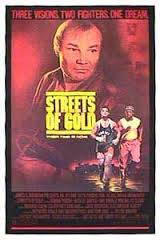
STREETS OF GOLD
US, 1986, 95 minutes, Colour.
Adrian Pasdar, Klaus Maria Brandauer, Angela Molina, Wesley Snipes, John Mahoney.
Directed by Joe Roth.
Streets of Gold is a boxing film. It is obviously in the vein of the Rocky series and came soon after Rocky's exploit with the Russian champion in Rocky IV. This is a very good natured film. It gains its strength from its star Klaus Maria Brandauer, the Austrian star of such films Mephisto, Colonel Redl, Hanussen, as well as Out of Africa and Never Say Never Again. His co-star is the Spanish actress Angela Molina, who has appeared in many significant Spanish films.
The local Coney Island hero is Adrian Pasdar (Top Gun, Near Dark). Brandauer is a Russian emigre, Jewish, who was a boxing champion in the Soviet Union but was not allowed to compete, because of his Jewish background and clashed with his coach. In Coney Island, he befriends some boxers and then trains them for a championship match between the United States and the Soviet Union (and his old coach foe). There is no surprise in the ending. Also in the cast as the team manager is John Mahoney. The film is set in Coney Island and uses its Brooklyn locations very well. There are the expected scenes of training and the final bout. Director is Joe Roth, a producer who also directed Revenge of the Nerds 2 and the interesting Coup de Ville.
1. Entertaining boxing film? Piece of Americana? In the Rocky tradition?
2. Coney Island locations, the beaches and streets, the buildings, gymnasium, cafes? The choreography and editing of the boxing training and bouts? Musical score?
3. The title, immigrants to America, the stories of the streets paved with gold? The reality of poverty and the reality of success?
4. Klaus Maria Brandauer as Alec: screen presence, arrival in Coney Island, looking at his room, the boarding house, the guests, friendship with Elena? His doing the wash up jobs, drinking, clashing with fellow workers? Wandering the streets? Not paved with gold? The gymnasium, watching the fight? Interest in the boxers, taunting Roland, bout in the street? The young white boxer watching him? His approach for training, Alec's decision, change in his own life? The training regime, leading the boxer on, early in the morning, sparring, training? The resistance of the boxer? Roland and his interest, clashes, joining the team, the double training? His change of attitude towards people, towards the United States? Love for Elana? His going to see the manager, persuading him to sign up the two as part of the team against the Soviet boxers? The dilemma with Roland wanting to become professional, the dinner and the clashes? Change of heart? Preparation for the bout? The fight in the street, Roland's hand being slashed? The build-up to the bout, the encounter in the locker room with the previous coach? The fight, victory? Transformation of the migrant?
5. The young boxer, bashing, hopes? With Roland? Watching Alec, asking him to help, the training and its demands, his previous manager and the poor deals with money? His girlfriend? Friendship with Alec, with Roland, past rivalries? The possibility of fighting for the United States? Persuading Roland not to go professional? The final training, the final bout, his being beaten, Roland urging him on, victory and achievement?
6. Roland , the black boxer, not wanting to be called punk? Victories, defeats? Training, interest in Alec, on his side, the possibilities of professionalism? The hand slashed? His good spirit?
7. Elana, the story of the Russian refugees? The people in the boarding house and their friendship? The restaurant, the contrast with the poor in the Soviet Union making fortunes in America? Elana as a statistician? Attracted to Alec, resisting him, attracted when he changed?
8. The manager, interest in the boxers, supporting Alec, at the fight, victory?
9. The characters of Coney Island, the racial mix, the immigrants? The Russians and their becoming American, supporting the boxers at the party? The hustlers and the managers?
10. A glimpse of New York City, life in Brooklyn? With an optimistic touch?
Published in Movie Reviews
Published in
Movie Reviews
Tagged under
Saturday, 18 September 2021 19:25
Stranger, The/ Agunuk
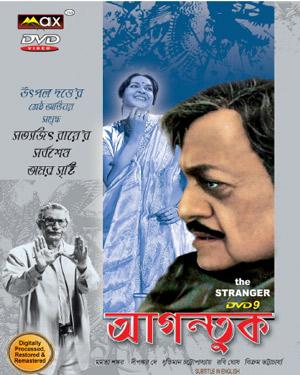
AGUNTUK (THE STRANGER)
India, 1991, 120 minutes, Colour.
Directed by Satyajit Ray.
The Stranger was the last film written and directed by classic Indian director Satyajit Ray. His career spanned 1955 to 1990 and he produced many classics including the Apu Trilogy, as well as a series of films observing life in India during the 60s and 70s and such films as The Chess Player and Home and the World (based on a story by Tagore) in the mid 80s.
This is a much more simple plot: a wealthy Calcutta family receive news that an uncle who had disappeared in 1955 was returning to visit them. They are wary. However, when he arrives, he is disarmingly charming, explicitly referring to their suspicions and questioning them about them). Some neighbours and visitors come to call out of curiosity. An official comes to cross examine the uncle to find his authenticity.
However, the family come under the sway of the stranger - an almost mystical type with a broad experience of the world outside India. He is the eternal seeker and plans to move on from them to Australia. There is the expected twist at the end.
The film is more theatrical and static, a great deal of talking. However, the film moves gently and is aided by the musical score - composed by Ray himself (as for so many of his films). The film is a portrait of wealthy Calcutta (quite in contrast to the world of City of Joy).
1. The work of Satyajit Ray? 35 years of classic Indian cinema? This film as his epitaph?
2. The world of wealthy Calcutta, homes and offices, the countryside? The class and cast system of India? The colour photography, editing and pace - and the musical score?
3. The film as a fable about family, suspicions and truth? The universal aspects of the fable? The Indian tone?
4. The long prologue and the arrival of the letter, Atila and her reading the letter, her reaction, family bonds? Her husband and his immediate suspicions? The little boy and his eagerness to meet the uncle? The background of the family, the style of the house, its modern conveniences? The establishing of family relationships? The decision about receiving the uncle?
5. The atmosphere of suspicion and the audience sharing it? The wife and her not knowing anything about her uncle, remembering the stories? But wanting to have an uncle? The business like and pompous tones of her husband? The little boy and his directness, especially with the uncle when he arrives? The actor and his wife, the gossip, the performance, leading the uncle on and unmasked? The lawyer and his interrogation, the severity of his tone? The banker? The audience sharing the experience and wondering about the true identity of the uncle?
6. The portrait of the uncle: in the traffic, the taxi to the house, the manner of his arrival, his age, bearing, experience? His charm? Anila and her attraction? The young boy and his delight, talking directly to the uncle? Eating and talking, reminiscing? The bath, the sleep, playing with the boys in the park - the story of eclipses and magic? The husband and his demand for the passport - and the uncle offering it? Then telling him to be suspicious about passports? The visit of the actor and the discussion about theories? The uncle and his background of Greek philosophy and the Dialogues? The interrogator and the discussion, savagery, technology? The uncle and his experiences in Europe, in jungle areas and his admiration for alleged savage civilisations? The ugliness of the U.S. and drugs? His sudden leaving of the home? Going to the country - and the dancing of the natives? His niece joining in and his delight? His courtesies? His experience of people, his bringing the family close together? The irony of their worrying about his stealing from them? And his giving them the money?
7. The build-up to his departure, the inheritance? The gift of the money - and the false identity?
8. Anila and her relationship with her family, bringing up her boy? Her suspicions especially after reading Agatha Christie? Her husband and his class consciousness, ambitions, work, treatment of servants? The phone calls? The scenes between husband and wife, discussions, the bedroom? His visit to the elderly lawyer - and the comedy of the misconstrued and misheard conversation? The visitors and his having to change attitude? Anila and the dance and her delight? Overcome by the cheque? The little boy, the story of the frog, the eclipse and magic, the coins - the gifts?
9. The theme of identity, truth? The Indian story with its background of the past, families, inheritance, leaving home, seeking identity in the world, art and culture?
10. A film for the beginning of the 90s and Satyajit Ray's bequest to Indian audiences?
Published in Movie Reviews
Published in
Movie Reviews
Tagged under
Saturday, 18 September 2021 19:25
Stations

STATIONS
Canada, 1983, 87 minutes, Colour.
Richard Boland, Bernard Cloutier.
Directed by William Mac Gillivray.
Stations is the first film by Canadian writer director Bill Mac Gillivary (whose other features include Life Classes, Understanding Bliss). Mac Gillivray works on small budgets, makes distinctively Canadian films and explores Canadian questions. In his first feature, he focuses on a successful television director who is in mid-life and in crisis.
In making a film about failure, he interviews a friend who was with him in the seminary in the early-60s - after seven years, they both left. However, the friend commits suicide and the journalist has to take stock of his life. His commission to go on a train across, Canada from British Columbia to Newfoundland, interviewing the average Canadians. He has to make decisions when he arrives home in Newfoundland.
The film uses a flashback framework, introducing us to the journalist in the seminary in the pre-credits, taking him on his journey but including flashbacks about his life, family life, work. There is a need for reconciliation with his severe father as well as finding new directions. Mac Gillivray writes literate screen plays but also relies on a range of images -television, video, home movies, photos.
1. The work of William Mac Gillivray, his Canadian perspective, style? Personal film-making in writing, images?
2. The title, stations of life, the train journey and the various stations? Moving and stationary?
3. The Canadian settings, travelling across Canada from West to East? The Canadian cities, the prairies? The towns - and Newfoundland? The musical score?
4. The prologue with Tom and Harry in the seminary, the piety of the time, the decision to leave? Tom's father and his hostility? Tom's memories? Interviewing Harry, Harry and his talk, regrets, drinking - thinking he still had a vocation to the priesthood? The impact of his monologue? His death and its affect on Tom?
5. Tom, his relationships, family, bonds? Success?
6. The television station, Tom's boss and his angers, Tom's clash with him? In front of the staff? Wanting to leave?
7. The commission for the train journey, the experience of the train ride, the staff on the train and getting their perspectives, the girl and the flirtation and her resisting? The range of people, old and young, their backgrounds, talking about themselves and Canada? The variety of views of Canada?
8. The return home, Tom's sister, filling in the background? The dance, happiness? His father?
9. The background of the clash with his father when he left the seminary? His father being demanding? Old, tough, the final confrontation? Possibility of reconciliation?
10. The meaning of the journey, the journey back to the past, the journey into midlife and crises and decisions, journey into the future?
Published in Movie Reviews
Published in
Movie Reviews
Tagged under
Saturday, 18 September 2021 19:25
Stanley and Iris
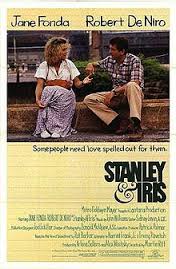
STANLEY AND IRIS
US, 1990, 195 minutes.
Jane Fonda, Robert de Niro, Swoosie Kurz, Martha Plimpton, Harley Cross, Fyodor Chaliapin, Jamey Sheridan, Zohra Lampert.
Directed by Martin Ritt.
Stanley and Iris is a pleasing film about ordinary people, factory workers in a big American city. It also highlights poverty, death, illiteracy and its consequences.
The film was written by Harriet Frank Jnr and Irving Ravetch, writers of many films for director Martin Ritt over several decades. Ritt directed this film. It has excellent naturalistic performances by Jane Fonda and Robert de Niro in the title roles. They act with an ease and conviction which endears them to the audience.
The film focuses on relationships, integrity, literacy and illiteracy. In the end it moves on to the fulfilment of the American dream of success which is genuinely American but may not be as attractive to audiences from other nations. However, there is a sweetness and wisdom about the film.
1. The impact of the film? A piece of Americana? The 80s and 90s? Ordinary people, poverty, literacy?
2. The American city, the factories, homes, streets? Authentic? The panning shots of the city and the opening credits? John Williams atmospheric score?
3. The title and the focus on the characters, the original novel title being Union Street?
4. Audience presumptions about life in the city, poverty, unemployment, literacy, success, wealth and the American dream?
5. Jane Fonda's interpretation of Iris: seeing her at work, on the bus, robbed and fighting back, Stanley helping her, going home and the easy bond between the two, respect? With her son Richard, with Kelly and the concern about her health? Sharon and Joe living in the house, the meal, the fight, getting the children to go for a walk? Managing the house, feeding the family, the use of money? Her organizational skills, the memory of her dead husband, her looking after him completely during his final illness?
6. Iris's ordinary life: going to the shoe mending shop, at work with the girls, going to the canteen, seeing Stanley in trouble, explaining that he couldn't read, her observations in the shoe shop? The bike ride home? Sharing outings with Stanley, the strong friendship? Her hurting him about his illiteracy and asking why he didn't do something about it?
7. Robert de Niro performance as Stanley: the story of his life, his father on the move, young, going to different schools? Asleep, not learning to read? At home with his father? Taking his father to the home? The shoes and his demands? Fighting for Iris, the bike ride? His bond with his father, the new home, discussions, the park bench and
eating the apple? Sharing with him, the sad news about his death and his not having a phone call? His inability to spell his father’s name? Grief? Loosing his jobs, shovelling and cleaning? His desperation? The clash with Iris when she pushed him?
8. The plea to Iris, filling in the form, coming to her place drunk? Opting out of the class? At home, friendship with Richard, walking through the park and naming the trees? The scenes of learning , gaining strength, but the hardships, the map and getting lost in the City? The bond with Trish, the sexual advance, the inability to consolidate their love? The change in Iris ? Wandering the streets, coming in, his invention?
9. Iris and her support of Stanley, teaching him, amazement at the inventions? The party and love for Sharon? The fight with Kelly, her pregnancy? The hurt, her visiting her in the hospital, telling the story of her birth and Iris's beginning to love her? At home, the bond with Stanley, love-making? The Boston hotel? His going to Detroit? her ordinary work, at the factory? Stanley's return and the future?
10. Her life at home, illness, her pregnancy, fight with her mother, the birth of the baby, learning about her mother's love for her, deciding to work in the factory?
11. Sharon and Joe, unemployment, drinking, fighting? Iris's support?
12. Stanley's father, age, support for his son, going to the home, his saying good things about the home and the bed and the room, out with his son, the pathos of his sudden death?
13. The work places, the bosses, giving people the sack, girls in the cake factory, the foreman and his pressures, the canteen? Waiting on bus lines etc.?
14 . The importance of the money, the initial robbery, management of money, illiteracy and poverty?
15. The theme of literacy, its consequences in the modern world?
16. A piece of Americana, finale with the American dream, everything is possible?
Published in Movie Reviews
Published in
Movie Reviews
Tagged under
Saturday, 18 September 2021 19:25
Special Friendship, A
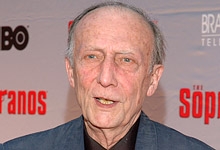
A SPECIAL FRIENDSHIP
US, 1985, 95 minutes, Colour.
Tom Aldredge, Richard Brooks, Le Var Burton, Tracy Pollan, Josef Sommer.
Directed by Fielder Cook.
A Special Friendship is a telemovie based on a true story during the civil war. It focuses on the friendship between a young white girl and the black slave who is bought by her family in Richmond Virginia in the 1840s. By the time of the war, the girls have grown up and the father of the family has freed his slaves. The Van Lew family is consequently not popular in Richmond, especially with the outbreak of the Civil War.
Both girls act as spies for the Union during the war and the film is interesting, highlighting the possibilities for espionage in the war - especially for the sake of abolition and the preservation of the Union.
The film is quite well acted, attractively mounted - but, avoiding much of the squalor of the par, it looks more like a Readers Digest version of the events. The film is directed by Fielder Cook, a specialist in telemovies.
1. Interesting telemovie? For the wide home audience? A piece of Americana?
2. Virginia in the 19th century, Richmond Virginia and wealthy society, the families, the slaves? The contrast with Philadelphia? the atmosphere of the Civil War? Musical Score?
3. The title, the focus on the friendship between Elizabeth and Mary, origins, slavery, racial prejudice, friendship transcending bigotry, education and learning, opportunities? in the war itself, each helping the Union side? Mary's saving Elizabeth’s life? Importance of the afterword - the reputation of Elizabeth Van Lew, post mistress in Richmond? Mary's disappearance and the monument to her?
4. The background of slavery, auctions? treatment of the slaves? The attitude of the owners? The atmosphere of the auction, Mr Van Lew and Elizabeth, her interest in Mary, the bidding for the family? Elizabeth taking Mary into the carriage? The parents walking behind? Life on the Van Lew property? Mary and Elizabeth as friends, Elizabeth educating Mary, sharing the lessons? her reaction to her mother? Her mother being from the North, helping the father to realise that the slaves must be freed? The father's death, reading of the will, the freeing of the slaves?
5. Elizabeth, going to college, the friendship with Mary? Her education? The return, her father's death, her grief? Using the money to educate Mary? The clashes with her mother? her place in Virginia society, her well known views, her attraction to Tom, his later criticism of them (and his not reporting her when she sheltered the soldier, his later interrogation of her)? going to parties, the applause for confederate victories? Being snubbed by the church group? The approach by Quacker, her sending him away, going to the bakery, motivation for espionage? The bakery, taking the bread to the Union lines? The visits to the prisons? The escape, sheltering the prisoner, caught by Tom, being let go? The visits to General Winder and getting his help? set-up, her giving of the information? arrest, the interrogation? The evidence not proving her guilty and her being allowed to go, her reunion with her mother and Mary, her defiance outside her house? Portrait of a patriot as well as a woman with social conscience?
6. Mary, her future as a slave, friendship with Elizabeth, the education and her memory? Being freed? Going to Philadelphia, enjoying school, her memory and capacity for learning? The Shakespearean performance and her meeting Ben, friendship, love, the marriage? His signing up and her return in Richmond? the household, Elizabeth and the decision she go to Jefferson Paris's home? Her angry reaction, Elizabeth's apology? in Davis’ household, pretending not to read, gaining the information, the boy reading it out? Her taking it to the Union headquarters, avoiding the massacre? reconciliation with Elizabeth, the sadness of Ben's death? the significance of her speech outside the house and the urging of people to live with one another?
7. Mr and Mrs Van Lew, the south, ethos, slaves, ideas from the North? Mr Van Lew’s death and the freeing of the slaves? Mrs Van Lew supporting her daughter? Snubbed, concern about the espionage? The finale?
8. Richmond society, slavery, fear of the north? Treatment of the slaves? The Jefferson Davis household, Davis being President, his wife and her attitudes? Treatment of slaves?
9. General Winder, the confederate army, his giving permission to Elizabeth? Suspicions of her, the set-up, his having to let her go? Tom and his patriotism?
10. Union soldiers, headquarters and the general? Prisons, escape? Humanitarian acts in the south for similar treatment in the North?
11. The glossy presentation of the story and characters? Suggestions of the horrors of war, anti-war speeches and sentiments? Insights into racial bigotry? Waging of the war? Abolition?
Published in Movie Reviews
Published in
Movie Reviews
Tagged under
Saturday, 18 September 2021 19:25
Songwriter
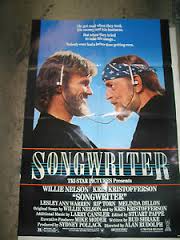
SONGWRITER
US, 1984, 94 minutes, Colour.
Kris Kristofferson, Willie Nelson, Lesley Ann Warren, Rip Torn, Melinda Dillon, Richard C. Sarafian.
Directed by Alan Rudolph.
Songwriter is a star vehicle for Kris Kristofferson and Willie Nelson. They play a team of country and western singers who are faced with financial difficulties. The film pokes fun at the big time producers and managers - as well as the small time ones. The stars are at ease in the central roles - and contributed songs to the score. Lesley Ann Warren is particularly good in support as Gilda, the country and western singer who undergoes re-born Christian experience to become a gospel singer. Rip Torn is her manager.
The film was directed by Alan Rudolph, not one of his own projects - he came in after the original director was fired. Rudolph is an idiosyncratic film maker (Trouble in Mind, Choose Me, Welcome to LA); however, he has made some more commercially oriented films such as Roadie, Endangered Species, Made in Heaven. This film is one of the more popular type. It is the conventional story of country and western singers on the road and their difficulties. Comparison might be made with Honeysuckle Rose which also starred Willie
Nelson.
1. A piece of Americana? Country and western music? The country and western circuit?
2. Texas, the small towns, the music circuit, on the road, locations and concerts, recording studios?
3. The musical score, the title song and its lyrics, the stars as writers and performers?
4. The title, the images of the songwriters of Kristofferson, of Nelson? In the world of American show business?
5. The country and western circuit: Doc, Blackie and Honey and their performances, the success, the fans, the pressure, managers?
6. The relationship between Doc and Honey, the background of his marriage, alimony? Honey wanting to settle down? The daughters? The sense of family? Financial needs, tension? Doc and his easy-going character, enjoying the road? His not being "above the money"? The encounter with Rodeo Rocky? Hopes?
7. Rodeo Rocky and his presence, type and style? The deals? The discussions with Doc? The work of the lawyers, their knowing the ropes? Manoeuvring for better deals? Doc and his relationship with Blackie, his office - but under Rocky's control?
8. His personal and business dilemmas? Settling down with Honey, the pressure from her, the children? Setting fire to the building? Moving to Austin? The assistance from Blackie? On the road again?
9. Gilda, her character, personality? Singing style? Her relationship with Doc and his promotion of her career? Her admiration for Honey? Relationship with Blackie, with Doc? The song written for her? Its success, the charts? The lie about her writing it for stopping Rocky with the royalties? Her nerves, her drinking? The outburst and her declaration of love for Doc? His response, her feeling guilty, her going to Honey, the encounter with Honey, the overdose?
10. The success of the song, Rocky and his greed? The royalties and control? His deals with Doc and Doc doing the deal about Gilda? And winning?
11. Dino and his type, manner, his patter as manager and agent, his relationship with his family, control of Gilda?
12. Gilda and the effect of her collapse, Christianity, a born-again Christian? Her relationship with Arley, the marriage, the change?
13. Doc and his success, Blackie and success? Gilda and the contract? Her singing the gospel songs - and Rocky fainting? Doc winning out?
14. Easy going performances and style? Country and western circuit? The amiable sequences of performance, Doc helping Gilda, playing with his daughter? The concerts? The perennial popularity of country and western with American audiences?
Published in Movie Reviews
Published in
Movie Reviews
Tagged under
Saturday, 18 September 2021 19:25
Song Writer
SONGWRITER
US, 1984, 94 minutes, Colour.
Kris Kristofferson, Willie Nelson, Lesley Ann Warren, Rip Torn, Melinda Dillon, Richard C. Sarafian.
Directed by Alan Rudolph.
Songwriter is a star vehicle for Kris Kristofferson and Willie Nelson. They play a team of country and western singers who are faced with financial difficulties. The film pokes fun at the big time producers and managers - as well as the small time ones. The stars are at ease in the central roles - and contributed songs to the score. Lesley Ann Warren is particularly good in support as Gilda, the country and western singer who undergoes re-born Christian experience to become a gospel singer. Rip Torn is her manager.
The film was directed by Alan Rudolph, not one of his own projects - he came in after the original director was fired. Rudolph is an idiosyncratic film maker (Trouble in Mind, Choose Me, Welcome to LA); however, he has made some more commercially oriented films such as Roadie, Endangered Species, Made in Heaven. This film is one of the more popular type. It is the conventional story of country and western singers on the road and their difficulties. Comparison might be made with Honeysuckle Rose which also starred Willie
Nelson.
1. A piece of Americana? Country and western music? The country and western circuit?
2. Texas, the small towns, the music circuit, on the road, locations and concerts, recording studios?
3. The musical score, the title song and its lyrics, the stars as writers and performers?
4. The title, the images of the songwriters of Kristofferson, of Nelson? In the world of American show business?
5. The country and western circuit: Doc, Blackie and Honey and their performances, the success, the fans, the pressure, managers?
6. The relationship between Doc and Honey, the background of his marriage, alimony? Honey wanting to settle down? The daughters? The sense of family? Financial needs, tension? Doc and his easy-going character, enjoying the road? His not being "above the money"? The encounter with Rodeo Rocky? Hopes?
7. Rodeo Rocky and his presence, type and style? The deals? The discussions with Doc? The work of the lawyers, their knowing the ropes? Manoeuvring for better deals? Doc and his relationship with Blackie, his office - but under Rocky's control?
8. His personal and business dilemmas? Settling down with Honey, the pressure from her, the children? Setting fire to the building? Moving to Austin? The assistance from Blackie? On the road again?
9. Gilda, her character, personality? Singing style? Her relationship with Doc and his promotion of her career? Her admiration for Honey? Relationship with Blackie, with Doc? The song written for her? Its success, the charts? The lie about her writing it for stopping Rocky with the royalties? Her nerves, her drinking? The outburst and her declaration of love for Doc? His response, her feeling guilty, her going to Honey, the encounter with Honey, the overdose?
10. The success of the song, Rocky and his greed? The royalties and control? His deals with Doc and Doc doing the deal about Gilda? And winning?
11. Dino and his type, manner, his patter as manager and agent, his relationship with his family, control of Gilda?
12. Gilda and the effect of her collapse, Christianity, a born-again Christian? Her relationship with Arley, the marriage, the change?
13. Doc and his success, Blackie and success? Gilda and the contract? Her singing the gospel songs - and Rocky fainting? Doc winning out?
14. Easy going performances and style? Country and western circuit? The amiable sequences of performance, Doc helping Gilda, playing with his daughter? The concerts? The perennial popularity of country and western with American audiences?
US, 1984, 94 minutes, Colour.
Kris Kristofferson, Willie Nelson, Lesley Ann Warren, Rip Torn, Melinda Dillon, Richard C. Sarafian.
Directed by Alan Rudolph.
Songwriter is a star vehicle for Kris Kristofferson and Willie Nelson. They play a team of country and western singers who are faced with financial difficulties. The film pokes fun at the big time producers and managers - as well as the small time ones. The stars are at ease in the central roles - and contributed songs to the score. Lesley Ann Warren is particularly good in support as Gilda, the country and western singer who undergoes re-born Christian experience to become a gospel singer. Rip Torn is her manager.
The film was directed by Alan Rudolph, not one of his own projects - he came in after the original director was fired. Rudolph is an idiosyncratic film maker (Trouble in Mind, Choose Me, Welcome to LA); however, he has made some more commercially oriented films such as Roadie, Endangered Species, Made in Heaven. This film is one of the more popular type. It is the conventional story of country and western singers on the road and their difficulties. Comparison might be made with Honeysuckle Rose which also starred Willie
Nelson.
1. A piece of Americana? Country and western music? The country and western circuit?
2. Texas, the small towns, the music circuit, on the road, locations and concerts, recording studios?
3. The musical score, the title song and its lyrics, the stars as writers and performers?
4. The title, the images of the songwriters of Kristofferson, of Nelson? In the world of American show business?
5. The country and western circuit: Doc, Blackie and Honey and their performances, the success, the fans, the pressure, managers?
6. The relationship between Doc and Honey, the background of his marriage, alimony? Honey wanting to settle down? The daughters? The sense of family? Financial needs, tension? Doc and his easy-going character, enjoying the road? His not being "above the money"? The encounter with Rodeo Rocky? Hopes?
7. Rodeo Rocky and his presence, type and style? The deals? The discussions with Doc? The work of the lawyers, their knowing the ropes? Manoeuvring for better deals? Doc and his relationship with Blackie, his office - but under Rocky's control?
8. His personal and business dilemmas? Settling down with Honey, the pressure from her, the children? Setting fire to the building? Moving to Austin? The assistance from Blackie? On the road again?
9. Gilda, her character, personality? Singing style? Her relationship with Doc and his promotion of her career? Her admiration for Honey? Relationship with Blackie, with Doc? The song written for her? Its success, the charts? The lie about her writing it for stopping Rocky with the royalties? Her nerves, her drinking? The outburst and her declaration of love for Doc? His response, her feeling guilty, her going to Honey, the encounter with Honey, the overdose?
10. The success of the song, Rocky and his greed? The royalties and control? His deals with Doc and Doc doing the deal about Gilda? And winning?
11. Dino and his type, manner, his patter as manager and agent, his relationship with his family, control of Gilda?
12. Gilda and the effect of her collapse, Christianity, a born-again Christian? Her relationship with Arley, the marriage, the change?
13. Doc and his success, Blackie and success? Gilda and the contract? Her singing the gospel songs - and Rocky fainting? Doc winning out?
14. Easy going performances and style? Country and western circuit? The amiable sequences of performance, Doc helping Gilda, playing with his daughter? The concerts? The perennial popularity of country and western with American audiences?
Published in Movie Reviews
Published in
Movie Reviews
Tagged under
Saturday, 18 September 2021 19:25
Six Bridges to Cross
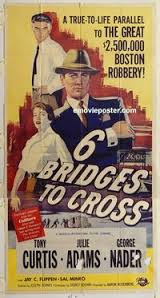
SIX BRIDGES TO CROSS
US, 1955, 96 minutes, Black and white.
Tony Curtis, George Nader, Julie Adams, Jay C. Flippen, Sal Mineo.
Directed by Joseph Pevney.
Six Bridges to Cross is a small gangster thriller from the mid 50s, directed by Joseph Pevney who was directing a number of similar features at Universal at this time. He later mover to television.
The film is a star vehicle for Tony Curtis who acquits himself well in the serious role of the Boston gangster. He has to age from a youth to a middled aged man. Curtis was about to change his career and move into more serious films with Sweet Smell of Success, The Defiant Ones, Spartacus.
George Nader also appears to advantage as the weary Boston cop. The supporting cast includes many of the regulars at Universal Studios.
The film was made in Boston and is based loosely on the Brinks' Robbery (also the subject of a telemovie and William Friedkin's The Brinks Job). Obviously a film of the 50s, but effective in its way.
(Sal Mineo is introduced in the film and portrays the young Curtis; there is a song by Henry Mancini sung by Sammy Davis Jnr.)
1.1nteresting gangster thriller? Study of the law? Loosely based on real events from the Depression and the early 40s?
2. Black and white photography, Universal Studios production? The cast? Musical score and title song?
3. The title and the focus on Boston? Life in Boston in the 30s and 40s? Slums? The police? The immigrants? Crime? The law?
4. The focus on Ed Gallagher and his work as a policeman: patrolling the blocks, the clash with the kid, the nervy shooting and visiting Gerry in hospital? His standing his ground and principles and being reinstated? His work in the neighbourhood? Gerry and the bond between them, his becoming a father figure? His getting information from Gerry, contacts with Gerry, disappointed with his behaviour - covering up for the rapist, his double dealings and robberies? His being in, prison for so many years? Wanting to join the military? The question of his nationality? Being released, man about town, Ed being best man at his wedding? Ed and Ellen and their support of Gerry? The final big job? Ed feeling betrayed? Talking straight to Gerry? The investigation, the arrests? His wanting to do a deal, getting the rapist so that Gerry could failure of the ploy? His relationship with the ion, the grand jury and the lawyers implications, the interrogations, behaviour? relenting?
5. The port, the transporting? The boss? The trial, Ed's testifying himself? The final talking to Gerry, Gerry's arrangement to meet, the shootout, his dying in Ed's arms? portrait of the gangs, seeing them as youngsters in Boston? The shooting? The information? Gerry in the neighbourhood, parents and family? Growing older, friendship with Ed, the rape attack and his going to prison? The robberies? Growing older, shrewder? Giving information to Ed? Tee big robbery? His pride, the gang? Not giving information? Imprisonment, the possibility of his being transported to Italy? His question of nationality, the background of military service? His marriage, family? His wife separating from him; telling him the truth? The agreement with Ed, explaining to members of the gang? The shootout and his death? The portrait of a small but shrewd gangster?
7. The picture of the gang members, around Boston, the depression, the war? Petty crime? Rape? Contacts with the police? Bigger crime, the big robbery and the two and a half million? Their reaction against Gerry?
8. The picture of the police, the chief, the investigation crime, accidental shootings? The pressure on the police? The possibilities of - corruption? Honesty and small incomes? Lawyers and grand jury’s, investigations?
9. A picture of American history? The perspective on gangsters in the past?
Published in Movie Reviews
Published in
Movie Reviews
Tagged under
Saturday, 18 September 2021 19:25
Sunstruck
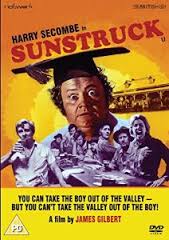
SUNSTRUCK
Australia, 1972, 89 minutes, Colour.
Harry Secombe, Maggie Fitzgibbon, Dawn Lake, Bobby Limb, Stuart Wagstaff.
Directed by James Gilbert.
Sunstruck: perhaps it will not encourage teachers to come to teach in the sun in N.S.W., as the famous poster advertised, but this film takes its origins from there and lands us in Kookaburra Springs (alias, near Parkes) and gives us a lightweight, but very pleasant, comedy that is suitable for all but the very sophisticated. Harry Secombe plays his role gently but humorously. All the Australian cliches are there, of course, but not too overdone. Although Harry wakes in fright at times, he eventually transcends the beer culture at Sydney Conservatorium. Music teachers will relish the boost the film gives their area' Enjoyable.
1. How enjoyable a comedy, a modest entertaining comedy?
2. For what audience was it made? Australian, British? Adults, children?
3. The title, the contrast with the rain in Britain? The importance of the advertisement about teaching In Australia In the Sun? The contrast with Wales? The background of the singing, the teaching? Stanley and his dreams of Australia? His watching of the athletics teacher, his having to get out?
4. The introduction to Australia by his flight, the glimpses of Sydney, the build-up in atmosphere, his continuing flight out into the country and the humour of this?
5. Harry Secombe as Stanley Evans and his character? The quality of Harry Secombe's personality, the engaging charm? His being characterised as a fat little Pom? His becoming a victim of Kookaburra Springs? Audiences liking him for his experience in Wales, victim in Australia?
6. Comment on his reaction to his arriving in Kookaburra Springs, his 'waking in fright' to the realities of the Australian bush, the Australian bush people? Their reaction to him on the bus? the schoolboy and how humorous, was the presentation of Kookaburra Springs? the landscapes, the look of the place? the school?
7. How realistic and how humorous was the presentation of Kookaburra Springs: the landscapes, the look of the place, the school and the pub? The pilot and his introduction to Australia? Mick and Sal and the way they ran the pub, Stevie and the others? Pete and his harshness, Shirley and her wanting to be married? (The fights between Peter and Abigail, the occasion of the visit to tune the piano? Shirley's shooting the beer bottle?)
8. The portrayal of life at the pub, the parents' and friends' meeting, the school, the classes? The humour of the pranks on poor Stanley?
9. His listening to choir and its exasperating Mick and the boys? The brainwave about the choir? The children’s' participating? the fairytale aspects, the ironic realism about the entry and the sending of the wrong tape? Stanley's involvement in training the choir and the response? An optimistic view of education?
10. The importance of the party before they went to Sydney, the atmosphere of conflict, Pete getting drunk and telling the truth, Shirley and her falling in love with Stanley?
11. The importance of Stanley's running away, his genuine feelings, the humour of the horse and his being lost in the bush? The people making it, up to him and his agreeing to go with the choir?
12. The build-up to the atmosphere of Sydney, its sights, the eisteddfod and the small group from Kookaburra Springs with the city choirs? The enjoyment of the choral singing and their performance? Their award? The moralising about their award? (How was this countered by the humour of the men of Kookaburra Springs trying to listen on the radio, Sal succeeding?)
13. The appropriateness of the wedding as the happy ending for this kind of film?
14. What view of Australia and Australians was taken? realistic? how much caricature, how much parody? How important is it for Australians to be able to laugh at themselves through this kind of film?
Published in Movie Reviews
Published in
Movie Reviews
Tagged under
Saturday, 18 September 2021 19:25
Real Mc Coy, The
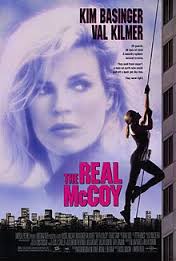
THE REAL McCOY
US, 1996, 106 minutes, Colour.
Kim Basinger, Val Kilmer, Terence Stamp.
Directed by Russell Mulcahy.
The Real Mc Coy is an entertaining bank robbery caper. It is a star vehicle for Kim Basinger, who is attractive in the central role. Val Kilmer is good in support. The villain is Terence Stamp.
The film has Georgia and Atlanta settings, takes advantage of technology. However, the plot and the characters are very familiar from the genre. Direction is by Russell Mulcahy, the Australian director of Razorback. For Hollywood he made the Highlander films as well as Blue Ice, Ricochet, The Shadow.
1. Entertaining heist, caper story? With '90s technology?
2. The Georgia backgrounds, the city of Atlanta, homes, the woods, the bank? Musical score?
3. The title and the slang phrase? Karen as the genuine article?
4. The impact of the opening, the robbery, the skill, techniques, strength? The security system? Being caught? To prison, the six years passing? Getting out - and audience expectations that it would be a man? Initial response to Karen?
5. Karen and her story, her marriage to Roy, the tomboy background? Love for her son? Roy telling Patrick his mother was dead? Her hopes in phoning Roy, wanting contact with Patrick?
6. The parole officer, his chauvinist treatment, pressure on her? The range of job interviews and the refusals? Finally getting work, the parole officer and getting her fired?
7. In the supermarket, watching J.T. and his bungled robbery? Meeting him at the parole board? His admiration for her? Offering her housing? His link with Jack, his visit to get help for Karen and a job? The irony of their dinner together and his touting for Jack?
8. Karen seeing Patrick, watching him in the park? The kidnapping, her being blackmailed by Jack? The rescue and the chase in the car, the forest? The parole officer and his brutality? Jack and his control?
9. Her agreeing to do the robbery, the building up of the team, the plan? Her disguise as Miss Baxter, the visits to the bank, charming the officer? Studying the plans? Her decision against Jack, the plan with J.T. and his planting the gun? The preparations?
10. Jack and his wealth, sinister? His mansion? His gang and their brutality? The parole officer in his pay? The symbolism of his having tigers in his park?
11. The heist detail, the security, the police coming four times? The different squads and their work? J.T. and the loss of power? The skill and timing? Locking Jack and the group in the vault? Her taking Jack's money from his safe?
12. The final confrontation with the parole officer, the rescuing of Patrick? The tigers? Going to the airport, the disguises? Roy and his having the gun, wanting the money, J.T. rescuing Karen? In the plane, the irony of the police and the organ transplant?
13. The nicely amoral ending, audience sympathies? Old-fashioned styled robbery filmed with comic touches?
Published in Movie Reviews
Published in
Movie Reviews
Tagged under